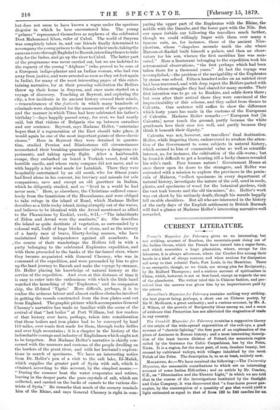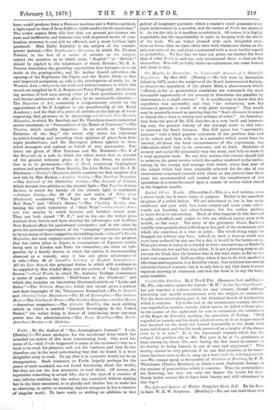CURRENT LITERATURE.
Fraser's Magazine for February gives us an interesting, but not striking, account of Bourbon, the mountain-peak rising out of the Indian Ocean, which the French have turned into a sugar-farm,. and which resembles a huge plantation, where, except for the labourers, it is always afternoon, where the Creoles live among their hands in a kind of sleepy content, and when anxious for dissipation sail away to that colonial Paris, Port Louis, in the Mauritius. There is an energetic, though, as we think, not strong plea for Reciprocity,. by Mr. Halford Thompson ; and a curious account of spiritualism in China, which, however, is not at first-hand, except as regards the use of the planchette. The writer tried this in Chinese fashion, and per- ceived that the answer was given him by an improvisatore paid by the priests.
Macmillan's Magazine for February contains nothing very striking. the best papers being, perhaps, a short one on Chinese poetry, by Sir W. Medhurst, a great authority; and a curious account, by Mr. A. J. Wilson, of the growth of Reciprocity ideas among ns, and a mass of evidence that Protection has not alleviated the stagnation of trade- in any country.
The Cornhill Magazine for February contains a suggestive theory of the origin of the wide-spread superstition of the evil-eye, a good account of " electric lighting," the first part of an explanation of the place of Antinous in Roman history; and a most interesting descrip- tion of the least known division of Poland, the mountain region called by the Germans the Celtic Carpathians, but by the Poles, Tatra. It is a region, for the most part, of rare, desolate beauty, but crossed by cultivated valleys, with villages inhabited by the most. Polish of the Poles. The description is, to us at least, entirely new.
MAGAZINES, &c.—We have received the following :—The University Magazine, the seasonable contributions to which are an interesting account of some Indian Hill-tribes ; and an article by Mr. Conder,. C.E., on "Illumination and the Electric Light," in which we are told that in the course of the investigations instituted by the Gaslight and Coke Company, it was discovered that "a four-horse power gas- engine, by the consumption of a quantity of gas that would yield a light estimated as equal to that of from 192 to 240 candles for as hour, would produce, from a Siemens machine and a Serrin regulator, a light equal to that of from 3,000 to 4,000 candles for the same time." 'The writer argues from this fact that our present gas-burners are rude and ineffective, and believes that with improved modes of com- bustion, economy in cost will be effected, and a more brilliant light produced. Miss Emily Faithfull is the subject of the contem- porary portrait.—The Gentleman's Magazine, in which Mr. Thomas Forster, in the first of a series of articles on the subject, argues the question as to which term, " English " or " British," should be applied to the inhabitants of Great Britain ; Mr. R. A. Proctor demolishes the gambling superstition that fortunes are to be made at the gaming-table ; and Mr. Arthur Arnold advocates the opening of the Euphrates, the Tigris, and the Karlin rivers to free and improved navigation, as aids to the development of trade, &c., in Western Asia.—Belgravia, the solid and serious contents in which this month are supplied by G. A. Rogers and Percy Fitzgerald. An interest. ing account of how ants, among other of their peculiarities, attack and devour earthworms is also given, by an unscientific observer.— The Magazine of Art, containing a congratulatory article on the appointment of Sir F. Leighton to the presidentship of the Royal Academy ; and the first of a series of articles on the history of wood- engraving, that promises to be interesting.—Co/barn's New Monthly Magazine, in which Mr. Smollett and Mr. Trevelyan receive somewhat severe treatment, in " Personalities of the House of Commons."—The Theatre, which steadily improves. In an article on "Dramatic criticism of the Day," the writer ably states his objections to critics forming and recording their opinions of plays from first- night productions; and Mr. Davenport Adams appeals to thea- trical managers and authors on behalf of trne pantomime. Por- traits are given of Miss Pateman and Mr. Burnand.—No. 2 of the Biograph, in a note to which the editor states that on account of the general welcome given to it by the Press, its publica- tion is to be permanent.—Men of Mark, containing biographical notices and portraits of Dean Stanley, Sir John Mellor, and Dr. J. H. Gladstone.—Tinsley's Magazine, which contains the first chapters of a new tale by Mrs. Buxton.—London Society.—The Nautical Magazine. —The Journal of the Statistical Society.—The Journal of Science, which devotes two articles to the electric light.—The Popular Science Review, in which the history of the electric light is continued. —Science Gossip.—No. 10 of the new series of Tales from Blackwood, containing "The Light on the Hearth," "How to Boil Peas," and " Clive's Dream."—The Cheveley Novels, con- taining the ninth instalment of " Saul Weir."—Chanibers's Jour- nal, two articles in which farmers and builders should read. They are both signed "W. C.," and in the one the writer gives extracts from letters and facts showing the advantages and facilities New Zealand offers for agricultural enterprise ; and in the other, he gives his personal experiences of the " scamping " practices resorted to by too many of those engaged in the building trade.—Cassell's Family Magazine, the most original articles in which are one on the progress that has taken place in Japan, in consequence of Japanese youths being sent to London and Paris for education ; the other on indi- gestion, by a family doctor, in which the author, in recommending charcoal as a remedy, says it has one great advantage,—it is safe.—Part 46 of Cassell' s Library of English Literature.— All the Year Round, the principal fiction in which still continues to
be supplied by Mrs. Cashel Hoey and the author of " Lady Audley's Secret."—Good Words, in which Mr. Anthony Trollope commences a series of papers, entitled, "Half-hours in the Fresh-air," and which also contains an interesting illustrated article on " Locks and Safes."—The Victoria Magazine, which this month gives a portrait and short biography of the Viscountess Strangford.—The St. James's and Charing Cross Magazines.—No. 11 of Kensington.—The Leisure Hour.—The Sunday at Home.—The Sunday Magazine.—Golden Hours.
—American magazines :—The Atlantic Monthly, the most striking article in which is entitled " Limited Sovereignty in the United States," the writer being in favour of introducing more one-man power into the administration.—The Penn Monthly.—The North- American Review.—St. Nicholas.



































 Previous page
Previous page